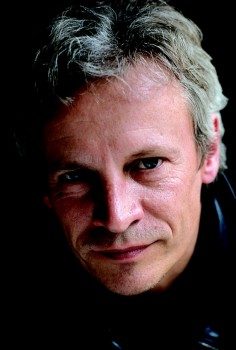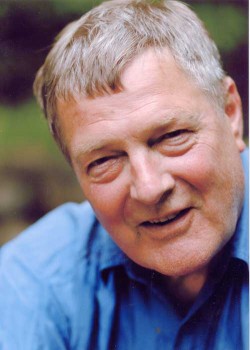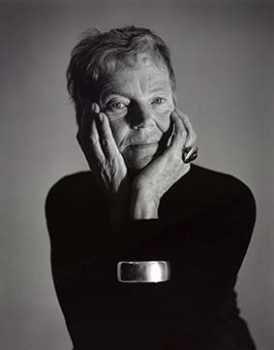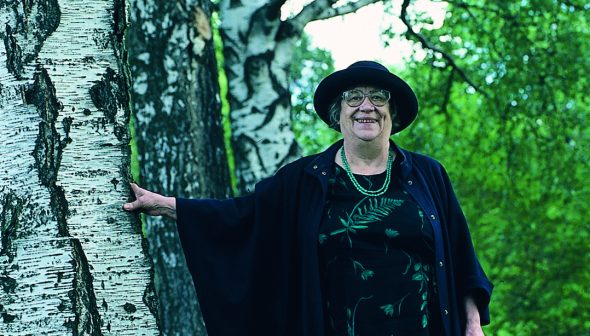poetry
Poems
Issue 2/1985 | Archives online, Fiction, poetry
Introduction by Bo Carpelan
A flower beckons there, a secent beckons there, enticing my eye. A hope glimmers there. I will climb to the rock of the sky, I will sink in the wave: a wave-trough. I am singing tone, and the day smiles in riddles.
*
Like a sluice of the hurtling rivers I race in the sun: to capture my heart; to seize hold of that light in an inkling: sun, iridescence. In day and intoxication I wander. I am in that strength: the white, the white that smiles.
*
To my air you have come: a trembling, a vision! I know neither you nor your name. All is what it was. But you draw near: a daybreak, a soaring circle, your name.
Eroica
Issue 4/1984 | Archives online, Fiction, poetry

Ilpo Tiihonen. Photo: Irmeli Jung
Poems from From Eroikka (‘Eroica’, 1982). Introduction by Pertti Lassila
Ilpo Tiihonen (born 1950) published his first collection of poetry in 1975. From the beginning, his poems have been couched in the language of the street, and he uses slang liberally. Tiihonen has always been opposed to the miniature idylls of nature that were so characteristic of the 1970s. He aims at the secularisation of poetry, and he uses humour and comedy as a counterweight to high culture. He has evidently been influenced in his technique by Mayakovsky and Yesenin, to whom he often refers in his poems. His preferences in the poetic tradition are apparent in the fresh and liberal new interpretations of poems by Gustav Fröding contained in his collection Eroikka. Unusually for a contemporary Finnish poet, Tiihonen makes extensive use of rhyme. The result is often strongly lyrical poems that could almost be called modern broadsheet ballads, and may also bring Brecht to mind. More…
Bearded Madonna
Issue 4/1984 | Archives online, Fiction, poetry
Poems from Parrakas madonna (‘Bearded Madonna’, 1983). Introduction by Pertti Lassila
The first volume of poems by Eira Stenberg (born 1943) appeared in 1966; since then she has published both poems and children’s stories. In her most recent collection, she examines human relationships within the family, divorce, motherhood and childhood. Stenberg’s voice is clear and concrete. Her treatment of both mother and child is unsentimental, sometimes ironic; perceptively and farsightedly she deals with the importance of childhood in the way it predestines the fate of the individual. No love or hate burns/ like that we receive as a gift from childhood, Stenberg writes in one of her poems. The home – protective, restrictive and punishing – is often the scene of her poems. The man, the father, is the butt of considerable irony and criticism, but Stenberg also destroys the myth of the madonna-like mother and the idyll of the home. More…
An intimation of Paradise
Issue 4/1984 | Archives online, Fiction, poetry
Poems from Paratiisiaavistus (‘An intimation of Paradise’, 1983). Introduction by Pertti Lassila
Satu Salminiitty (born 1959) has published only one collection of poetry since her first appeared in 1981, but with these two volumes she has achieved considerable success. She writes with a fine rhetoric using language and rhythm that are far removed from those of spoken Finnish. Religious pathos has a prominent place in her work, and her poems often derive from praise, prayer or even magic incantations; Salminiitty is a creator of vision who trusts to her metaphysical intuition, a quality not generally discernible among today’s Finnish poets. Equally rare is her lively faith in the goodness and beauty of people and of the world. A conscious rejoinder to materialism, pessimism and fear of the future can be read in her poems. More…
Poems
Issue 3/1984 | Archives online, Fiction, poetry
The poems of Aleksis Kivi were long considered no more than a peripheral aspect of his work. They were, as Kivi’s friend Kaarlo Bergbom wrote in a review, ‘gold that can’t be minted into coins’. The reason appears to have been Kivi’s poetic technique, which made a clear break with tradition. He did away almost completely with rhyme and instead emphasised the rhythm and musical sound qualities of words. He shortened words in a way that did not find favour with any subsequent Finnish poets. He avoided emotional expressions of patriotism and romantic love poetry; instead, he composed poems that were extended, narrative and fresco-like. Lauri Viljanen, whose 1953 study brought about a re-evaluation of Kivi’s poetry, has given them the apt soubriquet ‘epic idyll’.
The first of Kivi’s poems appeared in the Kirjallinen Kuukauslehti (‘Literary monthly magazine’) in 1866; a collection of his poetry entitled Kanervala was published the same year. Other poems appear in his novels and plays, and some have appeared in a collection after his death. Karhunpyynti (‘The bear hunt’) is from Kanervala. Its descriptive nature is typical of Kivi. The verse structure is tightly controlled but unrhyming. The winter landscape of the third verse, repeated at the end of the poem, is a ceremonious point of rest among the otherwise busy activity.
– Kai Laitinen
![]()
The Bear Hunt
The men on skis set out for the forest, a brave company
With guns and bright spears
And clamouring dogs on the leash,
With blazing eyes,
As the dawn chases gloomy Night
From the sky’s brow,
And the sun raises his head. More…
Poems
Issue 2/1984 | Archives online, Fiction, poetry
Interview by Philip Binham
Birdmount
I hear a happy tale, it makes me sad:
no-one will remember me for long.
I will send a letter with nothing inside, the emptiness will reek
as the pines do, of fruit-peel and of smoke,
a scent only.
Here I have stayed a week, seven riverside days.
The river treads the mill, ah, treads the mill,
the river’s wide, this is a placid reach, the sky is near:
smoke, like the shadow of a birdflock passing, nothing else.
And now it is September:
there are more pine trees here, and more darkness too. More…
Poems
Issue 1/1983 | Archives online, Fiction, poetry

Claes Andersson. Photo: Johan Bargum.
Claes Andersson (born 1937) became, during the 1960s, one of the few authors to free themselves from the modernist tradition so firmly established in Finland-Swedish writing in the 1920s to create poetry of a more distinctly personal kind. Claes Andersson’s poems are coloured by his training as a psychiatrist; he uses technical language in which scientific terms are exploited as an expressive device. His work also sometimes contains black humour and an ironical element calculated to shock the reader; they reflect the contrast between the dream of beauty and love and the grim reality of evil . To date, Andersson has published eleven collections of poems and a considerable number of plays for the stage, cabaret and radio. He has also written three novels, the latest of which – entitled En människa som börjar likna sin själ (‘The person who began to resemble his soul’) – is to appear in the autumn of 1983. For an introduction to Claes Andersson’s work, see Thomas Warburton’s article in Books from Finland 3/1979. Claes Andersson’s poems have recently appeared in translation in Poetry East, Seneca Review, Scandinavian Review and Grand Street.
Loneliness
My love, the moments I spend
in your cunt I forget my
migraine aching joints drinking problem grand mal paralysis
hallucinations pain between the shoulderblades short-
ness of breath hiccoughs dandruff dry skin vertigo bedwetting
impaired hearing chafed lips pustules liver
spots leg sores bleeding gums flatulence
sciatica crying fits thoughts of suicide swol-
len ankles pathological thirst Angst baldness double
vision facial twinges difficulty concentrating
cross eyes burning in the urethra running ears ring
ing ears cramps throat pain itching allergies
strange subcutaneous lumps cold hands nail-
biting hoarseness obesity jealousy vomiting
constipation sleeplessness noctural crying fits
failing memory pus in each nasal sinus and gout.
From Rumskamrater (‘Roommates’), 1974)
Writer in demand
Issue 3/1982 | Archives online, Fiction, poetry

Märta Tikkanen. Photo: Stefan Bremer
Poems from Århundradets kärlekssaga (The Love Story of the Century)
Märta Tikkanen (born 1935), a Finland-Swedish journalist, teacher and mother of four children, made her literary debut with the novel Nu imorron (‘Now tomorrow’) in 1970. It is a story of the liberation of one woman who breaks free from her traditional role. Her next novels, Ingenmansland (‘No man’s land’, 1972) and Vem bryr sej om Doris Mihailov (‘Who cares about Doris Mihailov’, 1974) brought her fame in Scandinavia, but it was not until her fourth novel, Män kan inte våldtas (Manrape, translated by Alison Weir, Virago, 1978) appeared in 1975 that she made her international breakthrough. To date the book has been translated into eight languages and a film adaptation has been made by Jörn Donner.
Her next work, a cycle of poems called Århundradets kärlekssaga (The Love Story of the Century, 1978) became very popular: it has been translated into seven languages as well as adapted for radio, television and the stage . In 1979 she was awarded the Nordic Women’s Alternative Literature Prize. Die Liebesgeschichte des Jahrhunderts, a monologue play based on Verena Reichel’s translation (Rohwolt Taschenbuch Verlag, 1981) is presently being staged in some twenty theatres in West Germany, Austria and Switzerland. Recently Der Spiegel devoted a page to her career. The American première, directed by Margaret Booker, will take place in Intiman Theatre, Seattle. More…
Poems
Issue 2/1982 | Archives online, Fiction, poetry
Introduction by George C. Schoolfield
The Cranes
Today the springtime shot its arrow point
into the winter’s heart:
the cranes’ crooked plow.
Today on the ice
the water splashed
half-a-yard high beneath the horse’s hooves –
may the magpie laugh cunningly
beside the ice-hole’s edge –
beneath the snow the earth growls
the hidden bodies of the trees cry:
the cranes the cranes!
From Taggiga lågor (‘Barbed flames’, 1924)
Poems
Issue 2/1982 | Archives online, Fiction, poetry
Sirkka Turkka is among the most important poets who started their work in the 1970s. So far she has published five collections of poetry and one work in prose. ‘I speak of death when I mean to speak of life,’ writes Sirkka Turkka in one of the poems in her collection Mies joka rakasti vaimoaan liikaa (‘The man who loved his wife too much’, 1979). The theme of death is close at hand, too, in the previously unpublished poems printed below. Introduction by Arto Kytöhonka
1
Before death itself comes
it paints the pine boles red
around this house
It erects a moon in the sky, a luminous moon,
set on edge like an old dish
with the light enamel peeling off.
Onto this house, over which
night is now pleating.
And the house, in the veering waters, in the clinging waters,
is slowly preparing itself, quite by itself, for death. More…
Poems
Issue 1/1981 | Archives online, Fiction, poetry
Introduction by Pekka Tarkka
Wind’s whistling through Europe’s windows
In the moonlight
when the mirrors are screeching
cold light, a silvery curse
the newsreel breaks loose, gallops
the window pane into blackness
Wind’s whistling through
Europe’s windows, the sky’s
full of flying Pickwick Club papers
Just a moment
International terror’s
switchboard diagram: the transistors
are hijacking the plane More…
Poems
Issue 1/1980 | Archives online, Fiction, poetry
Poems from Kallista on ja halvalla menee (‘It comes dear and it’s going cheap’,1975) and Reviirilaulu (‘Territorial song’, 1978). Introduction by Pentti Saaritsa
1
A seagull shadow flitters across the gulf of the courtyard
over the gone-sour yellow wall
ogreish and swift as an execution by hanging,
that’s how I’m dangling
from this moment in this city
my ankle in the strangling noose
in the night under the jangling stars while over the roofs
a sheetmetal moon’s rising
and blurred dreams are yawning in a thousand windows,
down below me the city
and in my breast my heart, it’s socking
like a knuckleduster.
2
The simplest noise,
the noise of a glass
when you put the glass down
on a wooden table, the sound of wood
on glass
is like
a flash of happiness
on a melancholy face.
Poems
Issue 3/1979 | Archives online, Fiction, poetry
Introduction by Thomas Warburton
1
What about going up into the birch tree together
so high till it bends with our weight
and we’re thrown, two seeds on one dandelion chute
down into the lake and its quaking looking glass
There we wash around together without
a stitch on our feelings
We let ourselves sink down to the lakefloor and set up
house there for a time
Among the fakirs the watercolourists and the alcoholics
we can hear the water sprite fluting, all out of tune
like a gipsy band gone down with the ship. More…
Poems
Issue 2/1979 | Archives online, Children's books, Fiction, poetry

Kirsi Kunnas. Photo: Jyrki Luukkonen
Poems from Tiitiäisen satupuu (‘The Tittytumpkin’s fairy tree’, 1956)
The old water rat
There’s a shiver of a reed,
a rustle in the grass,
a slop-slopping through the mud:
Who’s that puffing past?
Who’s that peeping there?
A whiskery head
and a muddy tread.
It’s Old Mattie
Water Rattie.
Squeezing water from his eyes,
trickling from his sneezing nose,
freezing and sneezing.
Then: Oh dear Misery!
A-snee, a-snee, a-snizzery! More…
Poems
Issue 1/1979 | Archives online, Fiction, poetry
Poems from Lähdössä tänään (‘Leaving today’, 1977) Introduction by Jouko Tyyri
1
‘The wind’s speaking.’ If the wind were really speaking
could we endure its words
so void, flinty, so groping?
Inside them
they have
salt, horror,
mania: a long-drawn black speechless
roller that wipes the coast clean
of houses, woods, junk. It swashes
your eyes. If I’d had some
feeling. Or thought. If
I was something. If I was I.
It’s gone.
There’s nothing here. Only a draught.
The air moving back and forth, soon to drop.
2
Orlando di Lasso's melodies
airy, without a touch of soil
a little dust on
as much as might be on a butterfly's wing
only just so much
Orlando himself, four hundred years
remoulded into loam, coalesced with dust
just like you, you, just like you More…
